











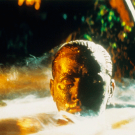
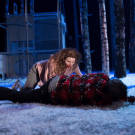



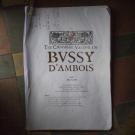

























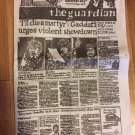
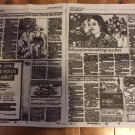





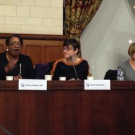

































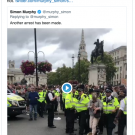











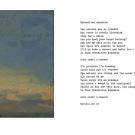


















First Sight: Younolovebunny
Copenhagen’s Claus Frøhlich, aka Younolovebunny, apparently presented his label with 700 potential songs when they first signed him, which just sounds like showing-off to us. The Dane reminds us of Brighton’s Gross Magic, whose gloriously grungey, hook-laden Sweetest Touch demo was one of the surprise highlights of 2011.
Frøhlich released a 14-track cassette via Almost-Musique, entitled Happy Nation II, at the beginning of January – sorry for the delay, these things happen – a culled five-track EP of which is currently streaming digitally here. He’s also posted a succession of spliced ‘n’ diced videos to accompany said five tracks, one of which is streaming above.
07 Feb 2013



















































































































Preview: Screening of Larry Clark's "anti-establishment skinny-teenager flick" Marfa Girl at the Book Club in Shoreditch
What: A screening of Marfa Girl
When: 12th February 2013. 6.30pm-9.00pm
Where: The Book Club, Shoreditch, EC2A 4RH
How much: Free
When a film-maker decides to bypass traditional distributors and critics to “reach the fans directly”, warning bells usually start to ring. Is Larry Clark’s flick Marfa Girl one of these films? After winning the top prize at the 2012 Rome Film Festival, it has only been available on the director’s website at a streaming cost of $5.99.
According to Clark, best known for Kids and Bully, which make Skins look like The Tweenies, this eschews the middlemen: “why not just go straight to the people, and cut out the Hollywood distributors and crooks?” But now the Book Club in Shoreditch has been given been given exclusive permission from Clark’s press office to hold a free screening on Tuesday February 12th.
Marfa is a small town in Texas close to the Mexican border. 16-year-old Adam (Adam Mediano), whose half-Hispanic roots make him look “like a young Mick Jagger”, wanders around town being seduced and spanked by a variety of women, from his heavily pregnant history teacher to his randy neighbour, but his one true love is his waif-like teenage girlfriend Inez (Mercedes Maxwell).
His arch-nemesis and psychotic pantomime villain of the piece is racist local cop Tom (Jeremy St. James), who is obsessed with Adam and his hot single mum. We also meet a New Age sound healer, a weed-smoking policeman, a burger joint waitress and various other artsy characters, all with a story to tell.
The small town is spiced up by the arrival of ‘Marfa Girl’, an unnamed, free-spirited artist who believes in free love – though only with uncircumcised Hispanic men – played by Austin native and art history student Drake Burnette.
If this interview is anything to go by, Burnette essentially plays herself in the film, spouting pearls of wisdom such as:
“if people fucked more there would be less wars”
“have you ever realised that when a guy is promiscuous he’s a player, but when a girl sleeps around she’s a slut”
“immigrants are just people”
and
“like, trying to deflect any competitive vibes with a vibe of, like, creative equality in the moment.”
Unsurprisingly, she also plans to bed Adam, but tells him she will wait for him to reach age of consent – provided he “has mastered the clitoris” by this time.
It’s a love-it-or-hate-it kind of film, and most of the reviewers have hated it.
But do head along if you’re into the idea of skinny teenagers wearing Converse and emo haircuts, full frontal nudity, graphic scenes of sex, drugs and rock & roll, anti-establishment aphorisms spoken in shrill Texan twangs, and faded desert landscapes reminiscent of Levi’s adverts.
See also:
Proof, in pictures and words, that David Bowie is the TS Eliot of our time
Generation Y problems solved: I’m overeducated for my job and slowly going stupid
07 Feb 2013
Welcome Snipe's new music editor and to our new fake office
Snipe is very pleased to announce the appointment of Tom Jenkins as music editor. Tom has been Deputy Music Editor for the past year, and editor in charge of MPFrees.
Email MP3s, invitations, interview entreaties to Tom at music@snipelondon.com
Calendar items should still be emailled to listings@snipelondon.com
Snipe thanks 2010 RoTD Best Editor nominee John Rogers for guiding the section for the past three years. John, who is stepping down to take care of his growing business, wil continue as a contributor to Snipe, where he’ll be called Music Editor Emeritus or At-Large or something.
Snipe has also moved its fake office. The old fake office, in a mailbox centre in Soho, has to suddenly move because the mailbox centre is suddenly moving.
The new fake office is now is Shoreditch, which should make everyone relax just a little bit.
The new address:
SNIPE
152 City Road,
London
EC1V 2NX
Of course, this is just another mailbox centre, so please don’t drop by and explain to the guy behind the counter why you had to put aluminium sheets over your windows of your flat in Islington because the people across the street were shooting some-sort-of-ray and Snipe is exactly the type of magazine that would not be scared to run that story, don’t you think?. Again.
Also, please do not send CDs. We just toss them. You want music coverage, go bug Tom by email.
07 Feb 2013
How to Dress Well - & It Was U (Elite Gymnastics remix)
How to Dress Well, aka Janet Jackson … sorry, Tom Krell, returns to the UK in May, including a date at Field Day festival in London on the 25th. Here, producer James Brooks, trading under the moniker Elite Gymnastics, makes all Krell’s (and our) 90s pop R&B fantasises come true with a smooth, fun remix of recent single & It Was U. Listen to Krell’s cover of Jackson’s Again, here.
05 Feb 2013



















































































































London's oldest anarchist bookshop firebombed over the weekend
Whitechapel’s Freedom Press, founded in 1886, was firebombed last Friday by persons unknown. Brian Whelan at Vice has the definitive story.
It’s not business as usual, but the shop has re-opened today. They would love donations of books.
04 Feb 2013
Evening Standard wins London TV bid
The Evening Standard has won their bid to operate London’s new local TV station.
Ofcom awarded the Standard the licence because they “demonstrated the greatest understanding of London’s diverse communities.”
They beat a number of rival bids including a consortium between ITN, Press Association, Time Out and others.
The decision means that London’s only dedicated newspaper and television channels will now be owned and operated by close friends of the Mayor.
Last year Boris Johnson went on a “purely personal” Italian holiday courtesy of Standard owner Evgeney Lebedev.
Current editor Sarah Sands is also a close family friend of the Mayor, and was appointed after an intervention by Boris.
Sands has been accused of suppressing stories about Boris Johnson.
This has led to frustration amongst some at the Standard.
Last week one journalist at the paper told me that it is now near impossible to get criticism of Boris into the paper “unless it’s David Cameron criticising him.”
Even those close to Boris admit in private how surprised they were at the sheer scale of support the paper gave him at the last election.
Under Ofcom rules, broadcasters have to abide by strict impartiality rules.
The channel will be available on all free digital terrestrial services and has agreed to launch within the next two years.
04 Feb 2013
Vondelpark - California Analog Dream
Dreamy Surrey trio Vondelpark seem to have hit the jackpot with this, a quite incredible reworking of a track that first appeared on their debut 2010 EP Sauna. It’s ambitious stuff from Lewis, Alex and Matt and one can’t help thinking the tag ‘the new XX’ will be hurled in their direction frequently over the coming months. Hopefully it won’t become an albatross. Like The XX, Vondelpark seem to have spent their time wisely, developing their sound from that of embryonic garage productions to spine tingling, festival-primed, atmospheric grooves with crossover appeal. In short, they now sound like a band that are going to be massive. Prepare yourselves for more gushing pieces from us, should the debut album – Seabed, out April 1 through R&S Records – turn out to be anything other than a steaming pile of dog crud.
01 Feb 2013
Idiot Glee - Pinkwood
If this track from the new Idiot Glee EP were to be represented in pictorial form – by a cartoonist, say – it would probably be drawn as a luxurious, caramel filled chocolate bar with stick arms and legs, playing a bass guitar, possibly with a pair of funky sunglasses on. Kentuckian James Friley clearly loves Roxy Music; his Life Without Jazz EP, out February 26 via Atelier Ciseaux/BureauBureau, is his first new material since 2011’s Paddywhack.
31 Jan 2013
In-depth interview: Steffan Donnelly tells us about performing a Welsh play, in Welsh, on the London stage
What: A play, Saer Doliau (Doll Mender), performed in Welsh with English surtitles
When: 3, 4, 5, 10, 11, 12, 17, 18 and 19 February
Where: Finborough Theatre, SW10 9ED, nr Earls Ct / West Brompton
How much: £14, £10 concessions
Snipe: Can you tell us a little about the substance of the play, what it’s about and what themes you think resonate with us now?
Steffan: Saer Doliau is an existentialist play written in 1966 by Wales’ most prolific playwright Gwenlyn Parry. With its surreal overtones, Pinteresque use of language, and mysterious characters it represents an important turning point in Welsh theatre, as it brought modernism to our stage.
It’s about an old Doll Mender, Evans, who goes about his business mending dolls in his workshop until a woman (called The Girl) strolls in unannounced. Without reference to Evans, she takes control of running the workshop, and appoints a new apprentice, The Lad (the part I am playing). Both of them play mind games to unsettle Evans and uproot his settled way of doing things. The finale of the play can be read on a number of different levels – a straightforward clash between old and new, the inevitability of modernisation, the lack of respect of the young for their elders and traditional ways, the incomprehensibility of existence, the rationality of belief in a higher being, and so on.
Throughout the play Evans has a relationship with the mysterious “Gaffer” – Evans believes that on the other end of the telephone is someone who will advise him and to whom he can complain. Perhaps one of the most poignant episodes in the play is when the Lad, somewhat unfeelingly, explains to Evans that there’s no telephone line into the workshop, so the phone can’t possibly be working. This forces him to ask himself whether he exists in a vacuum and has been imploring a non-existent higher power to help him.
The play also examines our obsession with modernisation, the role of women and the power women hold within our society, and asks searching questions about our existence (and beliefs).
Not many people in London (myself included) will be aware of the work of Welsh language playwrights. Can you put Gwenlyn Parry in context and help people understand why he is important and why Saer Doliau is worth reviving?
Sitting in class at the school I went to on Anglesey, we were told to watch a grainy video of a play we’d never heard of written by some old guy. It was Saer Doliau, and it was remarkable, like nothing we’d seen before. It was the first Welsh play my friends and I had seen, and we became obsessed with its themes, the questions it was provoking us to think about, the weirdness of the very moving story, and the ambiguous characters – to the point where we wrote and performed a response piece to it the following week!
Ask anyone who remembers the first production in the 60’s, or read the reviews of it, and you will find exactly the same response. It’s an enduring, timeless play. It’s a story which consumes you.
The play’s theatricality has been something we’ve explored in depth during rehearsals – Gwenlyn discovered a perfect marriage between his own visual way of looking at the world, his astute ear for language/dialect and his restless, questioning nature.
Gwenlyn’s work has influenced many creative people in Wales today. He showed bravery, going against the norm, he didn’t just give people what they expected on visits to the theatre. That’s something I really admire about him. All too quickly things can become staid and boring, people “make it” and replicate what they did to get there instead of keeping on reinventing, rediscovering, and being brave about what and why they’re doing it.
We spoke to Mathew Rhys (the Welsh actor) last week about this and he agreed with us, saying that “this incredible play, as did this incredible playwright, had an enormous influence on me. It’s an amazing piece”.
This is a play staged in London, performed in Welsh with English subtitles. Was that hard to get off the ground?
Surprisingly not. Invertigo [Steffan’s theatre company] represent the lesser-known, and two of us founding members are Welsh (Siôn from Cardiff, and myself from Llanfairpwllgwyngyllgoerychwyrndrobwllsantysiliogogogoch), and we both love Gwenlyn’s work and ideas – so it had to happen.
Initially we were going to do it site-specific in an actual timberyard in Walthamstow. In hindsight, thank God we didn’t, because I don’t think we’d have sold a single ticket for that!
I’d been talking with Neil McPherson (Artistic Director of the Finborough) about getting one of Invertigo’s Summer productions into the Finborough, and he felt that Saer Doliau would complement another play programmed in their season, a Scottish play in Gaelic (Somersaults by Iain Finlay Macleod, dir. Russell Bolam) about the destruction of the language.
Launching Saer Doliau in London (which is a premiere for the play in England) has some sentimental value too, because it was this theatrical city that was such an inspiration to Gwenlyn when he was a budding playwright (and full-time Maths teacher) spending his spare time seeing West End shows and getting involved with the London Welsh Drama Company.
It’s a big risk for us to take, the lively London-Welsh community is not quite big enough to carry this on its own, so we’re testing Londoners’ theatrical appetite here!
In fact, the appetite might already be here. UK culture has been very US-centric for the last 20 years, but perhaps we are now discovering a willingness to look farther afield (the success of BBC4 bought-in programmes like Borgen, The Killing, Montalbano, and the Globe’s Theatre of the World initiative last summer). Invertigo believes there is a whole world of untapped resources in Europe that have never really been mined, and this is one of our key aims. For example, we’ve just commissioned a translation of a Czech play which I’m going to adapt.
With devolution, there has been a greater interest about affairs in Wales and Scotland, and a corresponding confidence on the part of creative artists from those two countries. So there is fertile ground for trying to widen exposure to native-language traditions.
We’re confident that watching the play in Welsh with English surtitles will be a rewarding experience for the audience (using the surtitles as a crutch) – they will not only get to hear a Celtic language which is just three hours train journey away from them, but they will see a subtly different way of looking at things compared to the one they are used to.
A lot of people think of the Welsh as being very musical and beautiful speakers, but they’re often thinking of English spoken with a Welsh accent. They may never have heard Welsh spoken at length and uninterrupted. How much will experiencing the Welsh language be part of the effect of your performance, in addition to the dramatic effect of the play?
I was once told by a friend hearing me speak Welsh on the phone that I sounded like a camel having difficulty chewing. Thankfully, that particular response to my speaking Welsh is a rare one.
Camels aside, there is a flow to the colloquial Welsh used in this play which has captured the natural rhythms of Welsh-speakers, so it’s a very accurate picture of how Welsh sounds in day-to-day life. I’m biased, but I do really think that it’s a beautiful language which has huge expressive capacity. The accent you hear in English-speaking Welsh people matches the language’s unique musicality.
The other co-founders who have been in to see a run of the play have found it an unusual but captivating experience, saying that you can understand what’s going on and what people are doing to each other and that you almost con yourself into believing that you understand the language being spoken. I think this is testament to spoken Welsh’s ebb and flow and expressive capabilities, as well as the direction of the production, which has been focussed on pinpointing and visually accentuating relationships and key events in the text.
Welsh also has so many brilliant, often funny idioms and that was a challenge when I was translating this play for the surtitling. The translating process opened my eyes to how accurate Gwenlyn’s portrayal of Welsh-speakers are, and how his genius lies allowing dark humour and quirky colloquialisms to portray our way of speaking.
Can you talk about where Welsh language is at the moment? Do you hear Welsh being spoken when you turn your ear towards the far future? Or will performances like this one serve rather as a commemoration for something that cannot be expected to survive all the forces which seem to be against it?
I’m worried about the future of our language – the latest census showed another small drop in the number of speakers. Growing up, it was seen as the “uncool” language to speak and I assume that vibe still exists now.
I suppose I’m part of the problem because, like many Welsh people in the creative field particularly, I’ve moved to London to further my career.
I hope with every fibre of my being that this production of Saer Doliau won’t be a commemoration for ‘Rest in Peace Welsh’. Instead, I think it’s a small step forward for promoting Welsh as a European language which is useful and worthwhile to the rest of the world. It’s about promoting our heritage, culture, and creative work on the London stage.
I do find it frustrating when Welsh-speakers and political/linguistic organisations aggressively focus in on how to develop Welsh within Wales. We need rather to gather momentum behind the language, to pique people’s curiosity, to make it a “cool” thing.
My neighbour thought Welsh was an accent until two days ago, and of course – how can people know any different if we keep everything inside the borders of Wales? There’s some incredible Welsh-language work being made (TV, theatre, writing) but it won’t be seen by anyone outside of Wales. That sort of approach is not going to expand people’s knowledge of what we have to offer.
As with any minority nation, it’s imperative to look at globalisation as a two-way street. It isn’t just about economics and trade, it’s about culture, and it’s important to emphasise that cultural globalisation should not be one-way (an unhealthy monoculture), eg English being used for everything, or Western values supplanting indigenous ones. It should be a two-way process (a healthy ecology of multiple species). There should be more support and encouragement of work which is diverse and rooted in celebrating what we have and have sustained.
As a Welsh actor, does it feel different to be able to perform in Welsh? Or is this just another role?
Maybe I’ve been able to access a more honest part of myself, because I’m expressing my thoughts and moving the story along using my mother tongue.
The director, Aled Pedrick, comes from West Wales and there have been moments where he’s given me a note and he’s used a word from West Wales that I have no idea what it means! Every day I’m extending my West Walian vocabulary!
One thing I have to say is how much I have enjoyed being able to speak Welsh in London for such a sustained period of time! Being able to joke, argue, and discuss in it has been refreshing.
Finally…is bringing a Welsh language play to London an anti-imperialist act? I’m thinking of RS Thomas – the Welsh poet who wrote in English because he was denied the chance to learn Welsh: “England, what have you done to make the speech / my fathers used a stranger at my lips…” Do you feel a thrill of irony at the thought of English speakers in a theatre in London listening to a language they cannot understand? How much anger is there still in Wales at what English did to Welsh? Or is that the attitude of an older generation?
There is a thrill but for us it’s not an ironic or politically motivated one. Rather, it’s a thrill of discovery, of engaging with the unusual, the chance to experience something you might have a little knowledge of, afresh. In that sense it is a post-imperialist act, proving that all languages are equal in value, if not in status.
I think that developing a common cultural heritage is crucial for a healthy and thriving cultural landscape. We need to identify, applaud, and develop the diversity within our tiny island.
I am very aware of the history of aggression against Welsh people and the language, and sometimes I feel annoyed at those in England who are ignorant of that part of British history and the social changes which were forced upon the Welsh. There are astonishing examples like the Welsh Not (where speaking Welsh at school was punished with the cane in order to enforce English as the only language of education), and more recently the drowning of Tryweryn in the 1960s (where a Welsh village was flooded to provide a reservoir that would supply water for Liverpool).
The more we can identify with our heritage as Welsh people, no matter what our language, the better the chances of survival for Welsh. In a famous poem by TH Parry-Williams (Bro – which means the locality you belong to), he talks about how the very landscape will change to reflect his death, and ends:
Nid creu balchderau mo hyn gan un-o’i‘go –
Mae darnau ohonof ar wasgar hyd y fro.
These are not the fantasies of someone who has lost his mind –
There are pieces of me scattered across this land.
He is saying that people are not only transient figures in the landscape, they actually create that landscape in their daily lives. That is as true now as ever it was – it is up to the Welsh to continue generating the landscape (mental as well as physical) that they want their children to live in. Regarding Welsh itself, I think the renowned singer Dafydd Iwan said it best:
Er gwaetha pawb a phopeth
R’yn ni yma o hyd.
In spite of everyone and everything
We’re still here.
Previous in-depth interviews
Flash fiction publisher Holly Clarke explains how a 60-word story can still mean something
Helen Babbs on creating a new generation of urban nature writers
Photographer Mike Tsang on the blessing and the curse of growing up a Chinese Londoner
Kate Flowers of CoOperaCo on her mutualised operatic finishing school
Stratford filmmaker Winstan Whitter on what got lost when Dalston changed
31 Jan 2013



















































































































Boris Johnson refuses to oppose Lewisham A&E closure
Boris Johnson has refused to oppose the closure of Lewisham Hospital’s accident and emergency ward
He told the London Assembly yesterday that there was a “powerful argument” for closing the unit and said that it would be “inappropriate” for him to oppose it.
Green Party Assembly Member Darren Johnson said he was “deeply disappointed” that the mayor had refused to stand up for Londoners on the issue.
“The Mayor is letting down Londoners by failing to speak out in defence of their health service. The Mayor sought assurances from the Special Administrator that the proposed changes were clinically led, but there is not one iota of clinically led thinking behind these plans. It is about destroying a successful hospital because of unsustainable PFI debt elsewhere.”
The Mayor admitted that Lewisham hospital had been “victimised” because of failings elsewhere and said that there may be some legal obstacles to closing the unit.
However he told the Assembly that it was not his role to oppose accident and emergency closures.
“I have sought every possible undertaking from [the trust administrator] that clinical outcomes will be protected and improved… what we can’t do in the GLA is set up our own shadow NHS.”
In Boris’s first manifesto to be mayor he promised to oppose accident and emergency closures saying that:
“I want to see full Accident & Emergency services across London. Those extra minutes in an ambulance could mean the difference between life and death.”
He also joined the campaign against the closure of Queen Mary’s accident and emergency unit in Sidcup saying that “it is absolutely vital” to keep local A&Es open.
Today Darren Johnson attacked the mayor’s u-turn on the issue:
“The Mayor was very clear in his opposition to hospital closures back in 2008, but he is now refusing to stand up against the crazy proposal to close Lewisham A&E.
Health Secretary Jeremy Hunt is due to announce his decision on Lewisham Hospital this morning.
31 Jan 2013
Snipe Highlights
Some popular articles from past years
- Hope and despair in Woolwich town centre
- Punk brewery just as sexist and homophobic as the industry they rail against
- Random Interview: Eileen Conn, co-ordinator of Peckham Vision
- London has chosen its mayor, but why can’t it choose its own media?
- The best church names in London, and where they come from
- Margaret Thatcher statue rejected by public
- A unique collection of photos of Edwardian Londoners
- Only 16 commuters touch in to Emirates Air Line, figures reveal
- The five best places in London to have an epiphany
- Summer Camp: Roll out those lazy, hazy, crazy days
© 2009-2025 Snipe London.
